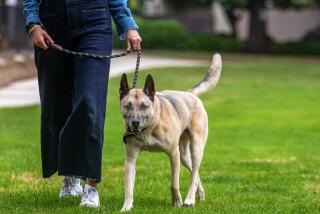Banning Breeds Won’t Prevent Killer Dogs
- Share via
So you think we should ban a breed of dog because one of its kind maimed or killed someone? Then let’s ban all 400-plus breeds, because aggression is not breed specific. Outlaw the English mastiff, the pit bull, the American Staffordshire terrier and the Rottweiler, and soon it will be the springer spaniel, the Boston terrier and the Old English sheep dog. Eventually, we will legislate some of our best friends into extinction.
Aggressive behavior in dogs is not a dog problem. It is a people problem. Shift your attention and your outrage to irresponsible breeders who create fighters, like the dog that killed Diane Whipple on Jan. 29 in San Francisco. Or to puppy mills that produce genetically inferior dogs. Most of all, take a hard look at dog owners you know--perhaps even yourself--who are uneducated about canines and unwilling to learn. Take aim at those who don’t recognize the signs of aggression or, worse, ignore them.
I hear it every day, dog owners who say, “My dog has bitten several members of the family, but it doesn’t happen all the time.” Once is enough, and it should tell you that something is wrong. Or how about the owner who is embroiled in a lawsuit because of his aggressive dog and now says, “I thought the growling problem would go away.” Take it from an expert: Aggressive behavior is not going to go away. You have to nip it in the bud.
What are the signs of aggression? Growling when you take the food dish away, or at the letter carrier, or at strangers. (There are 285 million strangers in the United States.) In fact, growling any time is a problem. Any snapping or biting, even if it doesn’t break the skin. Barking aggressively is a warning, too.
Dog owners have to assume responsibility and stop avoiding or denying the problem. Temperament testing and obedience training are essential for every dog--the younger the better. They are the only way an owner can understand a dog’s personality, learn how to communicate with a dog and gain the necessary control. Aggression problems in puppies--dogs under a year old--are easier to modify and the chances of success are good. Older aggressive dogs require special efforts.
All aggression problems need to be dealt with immediately, one-on-one, in a positive manner. No grabbing the dog’s collar. No yelling. No hitting. No electric shocks. Classes probably will not solve severe behavioral problems and may put other dogs and people at risk. Sometimes professional help may be needed. And, unfortunately, some dogs are so vicious that euthanasia may be the only humane and safe alternative. But simply banning breeds is never going to stop the problem of killer dogs.
Why don’t the owners of a potentially dangerous dog do something about the problem? Because they think they should be able to handle their own dog, or they don’t want to admit they are stumped about the problem or that they have raised an aggressive personality. They may not want to spend any money to correct the problem. Most of all, they don’t want to hear anything that suggests they might need to get rid of their baby. So the kettle boils.
Maybe it’s time to test dog owners to see if they understand the rules of responsibility. In other words, maybe we should license the owners, not the dogs.
Like everyone, I am outraged about Diane Whipple’s death. Hindsight indicates that all the signs were there before the 123-pound mastiff crossbreed went for the throat in that gruesome attack. Neighbors had earlier called this dog “beast” and “dog of death.” Local dog owners timed their walks to avoid this dog. Even its name--Bane--means “deadly harm, ruin, death.”
We have since learned that it appears this dog was bred for fighting, but a lot of dogs that have not been bred for such aggression exhibit the same frightening behavior. Too often, it goes unchecked until it is too late.






